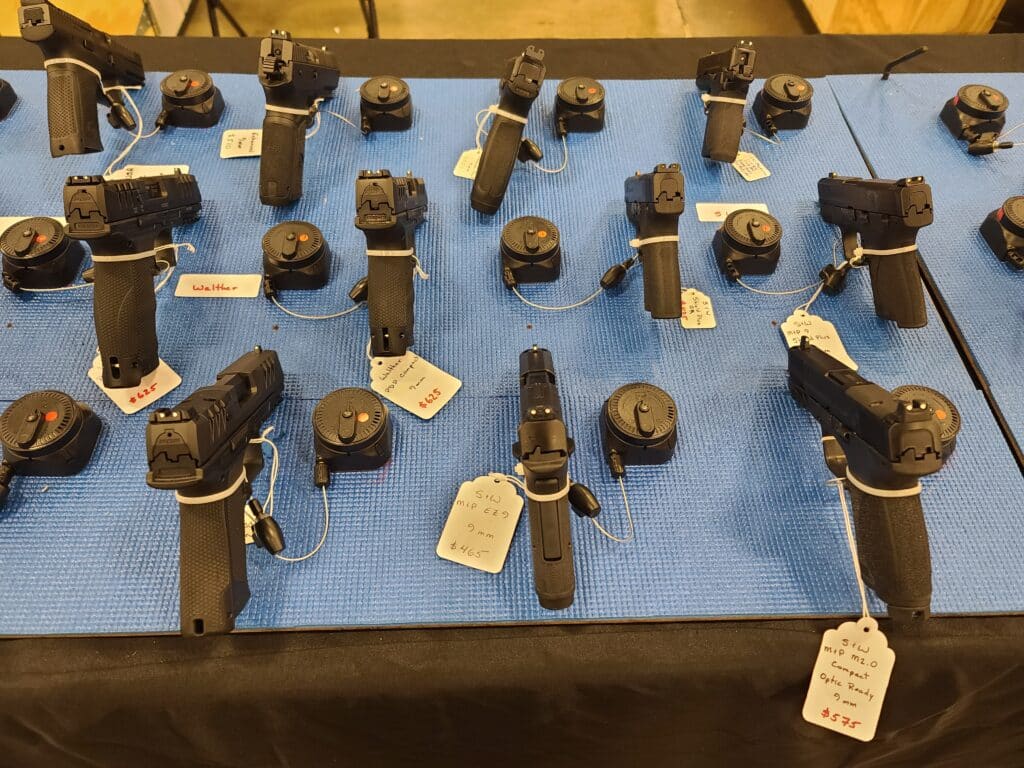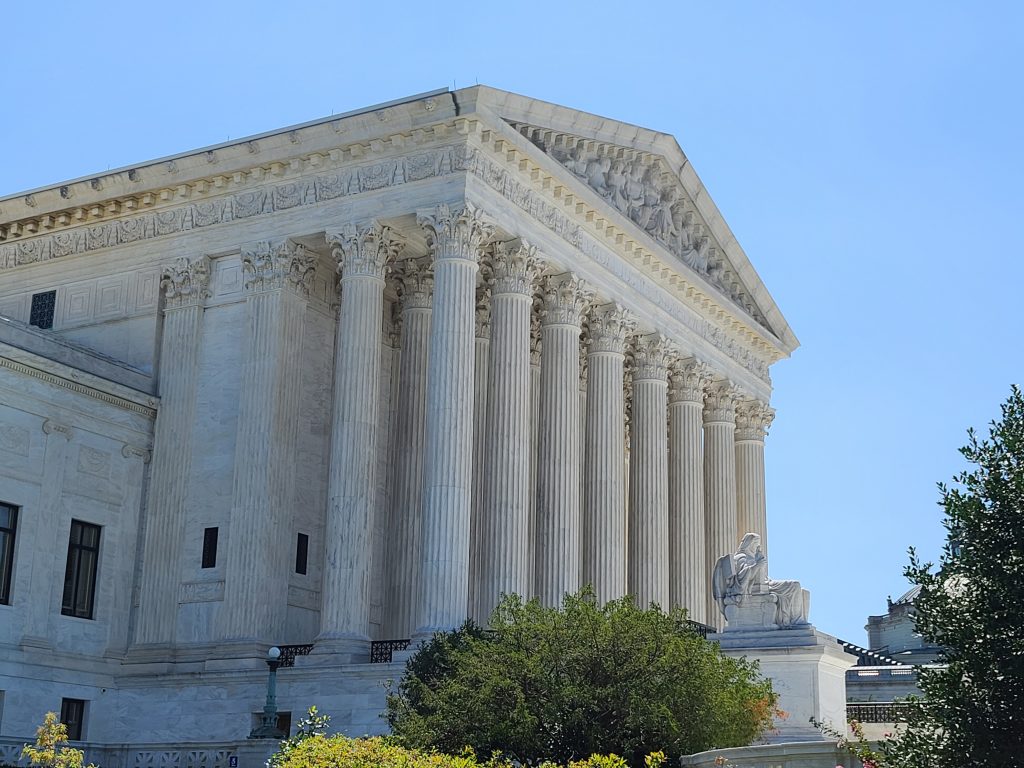The sound of silence. Good song. Appropriate description of what we heard on gun policy at the first Republican primary debate.
That’s odd since the candidates were directly asked about it. But, as Contributing Writer Jake Fogleman lays out, it also offers an opportunity for the candidates to differentiate themselves. AND it’s an issue primary voters themselves say they value quite highly.
I take a deep dive into the ACLU’s surprising brief in the Supreme Court’s latest Second Amendment case. It wants the Court to uphold the ban it’s reviewing, but it disagrees with the government on how much power it has to regulate guns. And the liberal group even casts doubt on the constitutionality of several significant portions of federal firearms law.
Plus, a law professor hoping to overturn Bruen and Heller joins the podcast to discuss the new SCOTUS gun case.

Analysis: What to Make of GOP Presidential Candidates’ Silence on Guns [Member Exclusive]
By Jake Fogleman
Amidst a wide-ranging and, at times, quarrelsome debate between the Republican presidential hopefuls on Wednesday, the eight candidates on the stage broached several topics important to Republican primary voters, from abortion to immigration. However, gun policy and the Second Amendment were notably absent.
The omission of a central tenet of Republican politics is curious for a number of reasons, not least of which is that the candidates were directly asked about the topic in the regular course of the debate.
“This weekend here in Milwaukee, reports say there were 30 shootings, and a number of them including kids. Add that to the big increase in school shootings around the country,” Fox News host Bret Baier said while queuing up the topic for former New Jersey Governor Chris Christie to respond. “Democrats blame this crisis on easy access to guns. They also blame Republicans for blocking gun control legislation. What would President Christie do?”
Christie used the prompt as an opportunity to draw on his background as a federal prosecutor rather than invoke the need to defend gun rights or support the Second Amendment. Instead, he proposed having other federal prosecutors usurp the role of prosecuting violent crime in cities from local officials deemed not up to the task. He also took the opportunity to criticize the President and his son for the illegal gun possession charge the latter currently faces.
The same question was then posed to businessman and relative newcomer to Republican politics, Vivek Ramaswamy. He, too, failed to broach the subject of gun policy and the Second Amendment and instead called for for increased policing and the return of mental asylums. That was the last time guns were mentioned in the debate, as the discussion proceeded to meander between a general discussion of crime and whether Americans have a crisis of national identity before ultimately moving on to new topics.
To say a lack of discussion on gun policy was a missed opportunity for the candidates is perhaps an understatement. Each of the candidates on stage Wednesday night has found themselves consistently trailing former President Donald Trump in the polls by sizeable margins. Yet, Trump has clear weak spots to his right on guns.
He failed to achieve any substantial pro-gun legislative wins during his tenure in office, and even endorsed stricter gun laws in the wake of the Parkland shooting—saying, “take the guns first, go through due process second” in support of a national “red flag” law. He also unilaterally instituted the federal bump stock ban after the Las Vegas shooting. That ban has now been found unconstitutional by two federal appeals courts.
Florida Governor Ron DeSantis (R.) let what seemed to be an obvious opportunity to go after Trump and to differentiate himself from the pack. Fresh off of his re-election victory in 2022, DeSantis signed a bill eliminating permitting requirements for lawful adults over 21 to carry a concealed firearm. That made Florida the 25th state to do so and the second-largest behind Texas. He also successfully pushed for and enacted new regulations that prevent banks from denying loans and accounts to people for lawfully owning guns or operating gun businesses.
DeSantis is one of the only Republicans currently running with a recent record of tangible pro-gun policy wins to stand on—a handy ace in the hole to have for a campaign beginning to show signs of sputtering.
Several of the other candidates on stage with gubernatorial experience boast similar track records of signing pro-gun bills into law. Longshot candidates Asa Hutchinson and Doug Burgum each signed bills expanding gun carry in 2017 as the Governors of Arkansas and North Dakota, respectively—campus carry for Hutchinson and permitless carry in the case of Burgum. Additionally, then-Governor Hutchinson signed a bill to make Arkansas a so-called “Second Amendment Sanctuary” state in 2021.
Senator Tim Scott, who lacks the resume of passing pro-gun legislation of some of his counterparts on the debate stage, could at least have pointed to his voting record on gun legislation in Congress, such as his “No” vote on the Bipartisan Safer Communities Act last Summer. Even Vivek Ramaswamy, who lacks any tangible political record to speak of, has previously expressed support for abolishing the ATF and passing a “national constitutional carry” law. Those sentiments, particularly regarding the ATF, are unlikely to be voiced by many of the other candidates on stage and would have certainly served to set Ramaswamy apart from the pack with Republican primary voters, one way or the other.
Gun politics has loomed large in American civic life recently. Since the last Presidential election, the country has experienced an extended period of record-setting gun sales, a massive spike in first-time gun ownership, a landmark Supreme Court decision affirming the right to carry a firearm in public for self-defense, a litany of lower court decisions casting doubt on all sorts of gun-control laws, and a current Presidential administration more committed than any other since at least the Clinton Era to enacting new gun restrictions.
These factors create fertile ground for the candidates to try and shore up support from a Republican primary electorate staunchly opposed to new gun-control laws. A CBS News/YouGov poll conducted earlier this year found that 66 percent of likely Republican primary voters prefer a presidential candidate who “opposes any gun restrictions.” That was second only to a candidate who “challenges woke ideas” on the list of top preferences for respondents. And a new AP-NORC poll conducted earlier this month found that support for stricter gun laws has dropped dramatically for Republican voters to just 32 percent, down 17 points from just a year prior.
Couple these trends with the need for trailing primary candidates to differentiate themselves from one another and the current frontrunner, and it’s clear that gun policy could be a real opportunity for certain candidates.
The next debate comes in late September. We’ll see if the candidates think better of remaining silent on Second Amendment issues then.
Podcast: Law Professor Who Wants Heller Overturned Explains His View of New SCOTUS Gun Case [Member Early Access]
By Stephen Gutowski
This week, we have Professor Dru Stevenson of the South Texas College of Law on the show to give his analysis of the Supreme Court’s latest Second Amendment case.
A few weeks back, we had pro-gun author and lawyer Mark Smith on to give his view of United States v. Rahimi. But I want to make sure we offer you all a wide variety of perspectives on where the case is headed. Stevenson certainly comes from a very different point of view, and he has an intimate knowledge of the case.
He joined a brief in the case alongside other professors and a gun-control group. They argued the domestic violence restraining order gun ban should be upheld. However, they went much further and argued both Bruen AND Heller should be overturned as well.
Stevenson and I discuss the reasons why he thinks the Court’s view of the Second Amendment as guaranteeing an individual right to keep and bear arms is wrong. We go through the common arguments and discuss their validity.
But Stevenson also acknowledged the Court is very, very unlikely to adopt his point of view. He said the brief was part of a long-term effort to build the foundation for completely undoing the Court’s gun jurisprudence at some point down the line. In the meantime, he gave his thoughts on where a majority of justices might actually come down in this case.
Plus, Contributing Writer Jake Fogleman and I talk about the lack of gun policy mentions during the first Republican primary debate.
You can listen to the show on your favorite podcasting app or by clicking here. Video of the episode is available on our YouTube channel. Reload Members get access on Sunday, as always. The show goes public on Monday.

Analysis: ACLU Warns of Government Overreach in Second Amendment Case [Member Exclusive]
By Stephen Gutowski
The American Civil Liberties Union (ACLU) believes the restraining order gun ban is constitutional, but, more interestingly, the liberal group also thinks some gun laws aren’t.
On Monday, the ACLU filed a brief in United States v. Rahimi that asks the Supreme Court to reverse a Fifth Circuit ruling that struck down the prohibition on those subject to domestic violence restraining orders possessing guns. But they also said the power claimed by the Government in its brief was dangerously broad. And it went on to question the constitutionality of numerous gun laws both on their face and as they’re applied in practice.
“The historical record is replete with relevant analogues, from 17th century England to the colonial era to Reconstruction, in which governments restricted gun possession by persons individually adjudged to pose a risk to others,” the ACLU wrote in its brief. “The United States’ brief lays out multiple examples of disarming such individuals predicated on specific findings of specific threats even as it urges the Court to adopt a far more expansive principle than necessary here. While some historical restrictions on gun rights were overbroad, lacking in due process, or rested on racist assumptions, the record nevertheless provides clear support—as then-Judge Barrett recognized—for the narrower principle that the Government can deny access to guns to people who pose a specific threat of violence to others.”
The group took a relatively expansive view of who, writ large, is covered by the Second Amendment. It cautioned the Government’s view of its own power to restrict the rights of those it protected is overly vague.
“The Court need go no further and adopt the United States’ sweeping assertion of power to deny Second Amendment rights to anyone not deemed a ‘law-abiding, responsible citizen,'” the ACLU wrote. “Constitutional rights generally extend to all persons within the United States, citizen and non-citizen alike. And it would be alarming if an individual’s entitlement to a constitutional right turned on the Government’s vague determination of whether they were ‘responsible.’ Nothing about the historical record or this case requires embarking on that path in order to reverse.”
Instead, it argued for a much more limited view of the Government’s power to restrict gun access.
“All the Court needs to do—and all that it should do—to reverse the decision below is to recognize that the founding generation, like their common law forebearers and Reconstruction-era officials after them, routinely restricted access to guns by individuals adjudged to pose a specific threat of violence,” the group wrote. “Court-imposed, time-limited restrictions on firearms possession following an individualized finding of danger to an intimate partner or family member—as is at least the case where Section 922(g)(8) is satisfied through subsection 922(g)(8)(C)(i)—fit comfortably within this historical practice.”
The ACLU also rejected the recent trend of using bigoted historical gun bans as evidence of the constitutionality of modern restrictions.
“Our history also includes more categorical gun regulations that were explicitly racist,” the group said. “For example, from the founding through Reconstruction, American laws routinely denied Black persons the right to possess firearms. Such laws would plainly violate the guarantee of equal protection as we understand it today. There is no need to rely on such laws to uphold the individualized disbarment imposed by Section 922(g)(8).”
Additionally, while the group argued Rahimi’s restraining order leading to a gun ban was justifiable because a judge found him to be a specific threat against the mother of his child due to alleged previous acts of violence, it questioned the other type of restraining order that can lead to a gun ban. It argued barring somebody from owning a gun because they were subject to a restraining order that forbids committing violence against an intimate partner but doesn’t allege there’s a specific reason to believe the subject is a threat is on shakier constitutional grounds.
“It is a distinct question whether the historical analogues discussed above provide sufficient support for restrictions imposed on this lesser showing of need,” the ACLU wrote.
It also differentiated the restraining order ban from the other gun prohibitions found in federal law because the ban goes away once the order is lifted. The ACLU argued that because the same could not be said of other categorical prohibitions, some of them may violate the Second Amendment.
“Other subsections of Section 922(g) apply in perpetuity to broad categories of persons based on status alone, and are therefore more difficult to fit under historical precedents of disarming individuals found to pose a specific threat to others,” the group wrote. “They impose sweeping restrictions on all persons with a prior felony conviction, on persons who use drugs, on persons deemed mental unfit, and on ‘aliens,’ among others, without supplying such persons any opportunity to regain their Second Amendment rights. Those provisions require a different, and more searching, historical inquiry to determine whether they comport with the Second Amendment—an inquiry they may well fail to satisfy.”
The civil liberties group also questioned the application of gun laws. It argued enforcement of some restrictions is disproportionately targeted at minorities, especially burdensome possession restrictions.
“The ACLU is committed to fighting mass incarceration and overbroad gun possession laws that fuel that phenomenon. It is committed to equal protection of the law and opposes the use of gun possession laws to unfairly target people of color,” the group wrote. “And the ACLU is committed to due process and fundamental fairness for all, and therefore condemns procedures to restrict constitutional liberties arbitrarily, without due process, or that impose unnecessarily excessive restrictions.”
Even so, the group concluded the questionable constitutionality of some firearms regulations is a question for another case because the law at issue in Rahimi is sound.
“But this case does not present such policy or constitutional questions,” the ACLU wrote. “It asks only whether one particular gun regulation, which prohibits firearms possession by persons subject to certain domestic violence restraining orders, on its face violates the Second Amendment. It does not.”
Understandably, the ACLU’s brief is already eliciting skepticism from some gun-rights activists. The liberal group filed a brief in support of New York’s effective ban on gun carry during last year’s New York State Rifle and Pistol Association v. Bruen under the dubious claim that striking it down would imperil New Yorkers’ First Amendment rights. This brief suggests the ACLU would support other challenges to gun laws, but it doesn’t change the reality that they have yet to do that in a Supreme Court case.
The ACLU’s brief also faces the same fundamental problem the Government’s brief ran into: There weren’t restraining orders that authorized confiscating guns from those accused of domestic violence during the Founding Era.
It has tried to address this issue by noting a “historical twin” isn’t necessary under the Bruen standard. It also argued that domestic violence and firearms were quite different in early American history. It claims domestic violence wasn’t taken seriously until much later. And the ACLU said firearms development in the centuries since the Second Amendment was ratified has led to their increased use in domestic abuse, thus creating a uniquely modern problem the Founders couldn’t have foreseen, so a broader approach to IDing the analogues required by Bruen.
It’s certainly possible this line of argument will convince five justices. However, it will have to overcome the basic fact that domestic violence and guns existed at the founding, but a law banning the possession of the latter because of a restraining order triggered by the former didn’t exist.
The Government’s practical argument that overturning the law would result in laws from nearly every state being affected does seem likely to help get some of the conservative justices to adopt this line of thinking. However, the ACLU’s suggestion of limiting the Government’s ability to restrict gun ownership to only those found by a judge to be a specific threat to others could provide those same justices with the comfort to make that decision.
It would not be surprising to see a Supreme Court reluctant to toss a widely accepted temporary gun ban take the ACLU’s third way to uphold it while limiting the Government’s potential reach.
That’s it for now.
I’ll talk to you all again soon.
Thanks,
Stephen Gutowski
Founder
The Reload







